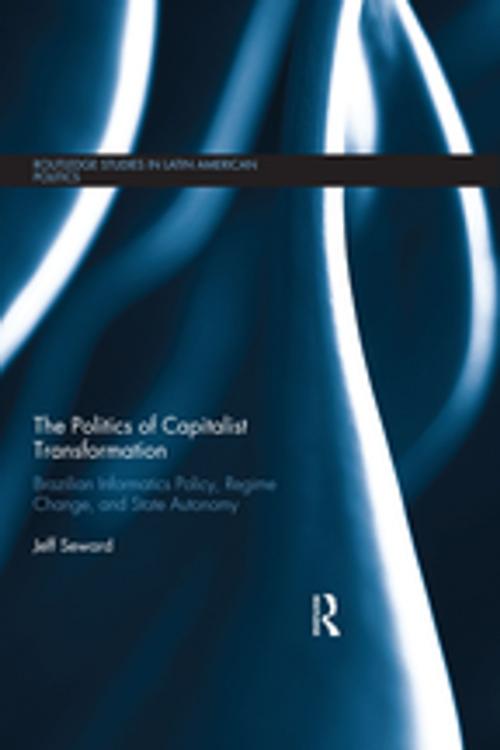The Politics of Capitalist Transformation
Brazilian Informatics Policy, Regime Change, and State Autonomy
Nonfiction, Social & Cultural Studies, Political Science, Government, Public Policy, International| Author: | Jeff Seward | ISBN: | 9781317269540 |
| Publisher: | Taylor and Francis | Publication: | December 8, 2016 |
| Imprint: | Routledge | Language: | English |
| Author: | Jeff Seward |
| ISBN: | 9781317269540 |
| Publisher: | Taylor and Francis |
| Publication: | December 8, 2016 |
| Imprint: | Routledge |
| Language: | English |
The Politics of Capitalist Transformation is the only book-length study of the highly protectionist Brazilian informatics policy from its origins in the early 1970s to the collapse of the market reserve in the early 1990s and its impact in subsequent decades.
Jeff Seward provides a sophisticated political analysis of how state activists constructed high levels of state autonomy to try to shift Brazil to a new variety of capitalism by eclipsing the multinational companies (especially IBM) that dominated the Brazilian computer sector and replacing them with local companies with 100 percent Brazilian technology and ownership. This ambitious policy required repeated shifts of political strategy and policymaking institutions to respond to a constantly changing economic and political environment as Brazil made a dramatic transition from military dictatorship to democracy.
The innovative framework to analyze state autonomy and the sophisticated political analysis of the policymaking process will be of interest to scholars and students of Brazilian and Latin American political economy, varieties of capitalism theory, state theory, democratic transition theory, and high technology policymaking in developing countries.
The Politics of Capitalist Transformation is the only book-length study of the highly protectionist Brazilian informatics policy from its origins in the early 1970s to the collapse of the market reserve in the early 1990s and its impact in subsequent decades.
Jeff Seward provides a sophisticated political analysis of how state activists constructed high levels of state autonomy to try to shift Brazil to a new variety of capitalism by eclipsing the multinational companies (especially IBM) that dominated the Brazilian computer sector and replacing them with local companies with 100 percent Brazilian technology and ownership. This ambitious policy required repeated shifts of political strategy and policymaking institutions to respond to a constantly changing economic and political environment as Brazil made a dramatic transition from military dictatorship to democracy.
The innovative framework to analyze state autonomy and the sophisticated political analysis of the policymaking process will be of interest to scholars and students of Brazilian and Latin American political economy, varieties of capitalism theory, state theory, democratic transition theory, and high technology policymaking in developing countries.















